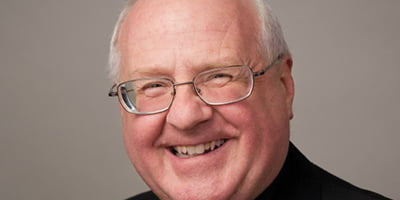
Father Mark Goldasich is the pastor of Sacred Heart parish in Tonganoxie. he has been editor of the Leaven since 1989.
by Father Mark Goldasich
What are you, a man or a mouse?
Well, based on this fable by Leo Tostoy, I’m a mouse:
A mouse lived under a granary. She always had plenty to eat because there was a small hole in the granary floor that allowed grain to slip through and form a little pile each day.
The mouse was very proud of her situation and wanted to tell other mice how well she lived. She gnawed a larger hole to allow more grain to fall. Then she invited all her friends over for a feast — not out of generosity, but to show off her good fortune.
When the friends arrived, however, she discovered that she had no grain, for the farmer had noticed the big hole and closed it up. (Adapted from “Stories for the Gathering,” by William R. White.)
That little mouse wasn’t satisfied with having all that she needed. No, she wanted more. And, in the end, it cost her everything.
Sometimes I look around my home and see all that I have. Instead of feel- ing humbled by my good fortune, I just keep “gnawing a bigger hole” and add more to what is already too much. The real danger is not so much in running out of room, but in becoming greedy and, in the process, losing my heart — for God and for the poor. And if you lose your heart, you’ve got nothing.
This issue has several pages devoted to poverty right here in the archdio- cese. It makes me uncom- fortable knowing that there is so much need so close to home. Echoing in my heart is the Gospel from a couple of weeks ago about Lazarus and the rich man. It’s always haunting to hear Father Abraham say to that rich man, “My child, remember that you received what was good during your lifetime, while Lazarus likewise received what was bad; but now he is comforted here, whereas you are tormented.” Wow, because I am comfortable here in this life, I’d hate to hear those words said to me in the afterlife.
To avoid such a fate yourself, take time to read these local stories about those who are struggling in life . . . and those who have stepped forward to do something to alleviate that pain. So often we simply refer to people living in poverty in a dismissive way. We need to be reminded that, like in Luke’s Gospel above, they have a name, they have dignity, they “count.”
Every year on Oct. 17, the United Nations sponsors the International Day for the Eradication of Poverty. Its website highlights something that needs to be remembered: “Our societies too often ignore or undervalue the knowledge of people living in the worst situations of poverty because we assume wrongly that people who lack so much in terms of material wealth, social position and political power, must also lack any knowledge or understanding that could be useful to others.” This results in efforts and programs “ill-adapted to the needs, realities, and expectations of the people they are supposed to be helping.”
Happily, that is not the case with the Sandwich Ministry and Marian Clinic in Topeka and with The Learning Club in Kansas City, Kan. These ministries, as well as many others in the archdiocese, do seek first to listen to the people who come to them, and not only provide services. These programs are so successful because the real needs of the poor — for food, med- ical care and education — have truly been heard and then answered in a practical, helpful manner.
I’d like to propose a simple exercise for the rest of this month. Most of us get appeal letters in the mail. Instead of tossing them in the trash, pick out one and “listen” to the story of the need inside. Gaze on any pictures that may accompany the appeal. Send a donation, if possible, or offer some prayers for the charity and the people it serves.
When it comes to the poverty around us, let’s be as quiet as a church mouse, so we can finally listen, and respond to, the cries of the poor.


